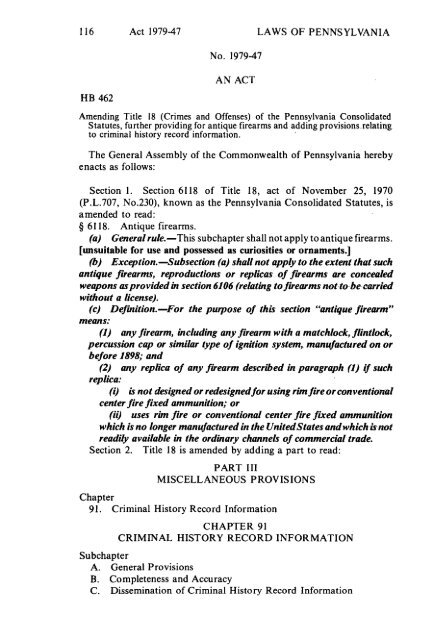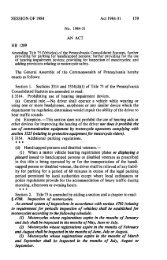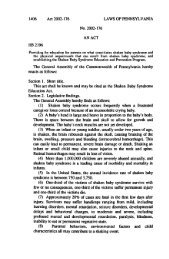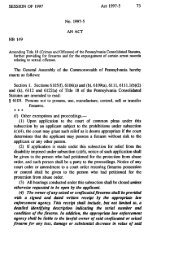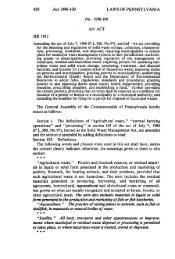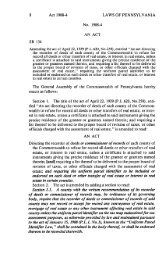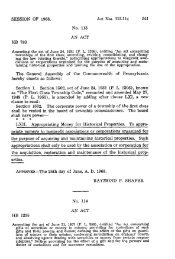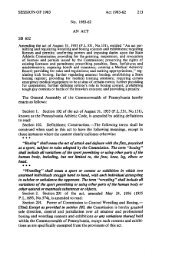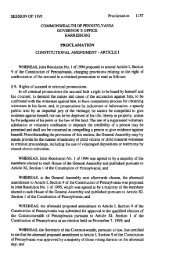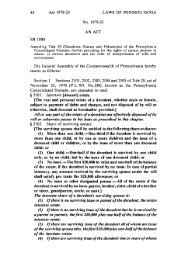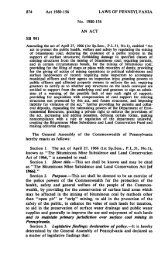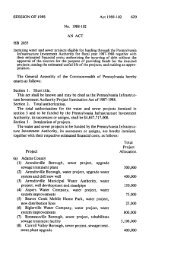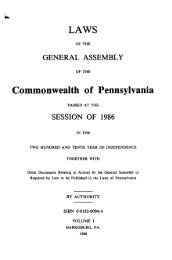(18 Pa.C.S.) - amend - antique firearms and criminal history record
(18 Pa.C.S.) - amend - antique firearms and criminal history record
(18 Pa.C.S.) - amend - antique firearms and criminal history record
You also want an ePaper? Increase the reach of your titles
YUMPU automatically turns print PDFs into web optimized ePapers that Google loves.
116 Act 1979-47 LAWS OF PENNSYLVANIA<br />
HB 462<br />
No. 1979-47<br />
ANACT<br />
Amending Title <strong>18</strong> (Crimes <strong>and</strong> Offenses) of the Pennsylvania Consolidated<br />
Statutes, further providing for <strong>antique</strong> <strong>firearms</strong> <strong>and</strong> adding provisionsrelating<br />
to <strong>criminal</strong> <strong>history</strong> <strong>record</strong> information.<br />
The General Assembly of the Commonwealth of Pennsylvania hereby<br />
enacts as follows:<br />
Section 1. Section 61<strong>18</strong> of Title <strong>18</strong>, act of November 25, 1970<br />
(P.L.707, No.230), known as the Pennsylvania Consolidated Statutes, is<br />
<strong>amend</strong>ed to read:<br />
§ 61<strong>18</strong>. Antique <strong>firearms</strong>.<br />
(a) General rule.—This subchapter shall not applyto <strong>antique</strong> <strong>firearms</strong>.<br />
[unsuitable for use <strong>and</strong> possessed as curiosities or ornaments.]<br />
(b) Exception.—Subsection (a) shall not apply to the extent that such<br />
<strong>antique</strong> <strong>firearms</strong>, reproductions or replicas of <strong>firearms</strong> are concealed<br />
weapons asprovided in section 6106 (relating to<strong>firearms</strong> not-to-be-carried<br />
without a license).<br />
(c) Definition.—For the purpose of this section “<strong>antique</strong> firearm”<br />
means:<br />
(1) any firearm, including any firearm with a matchlock, flintlock,<br />
percussion cap or similar type of ignition system,, manufactured on or<br />
before <strong>18</strong>98; <strong>and</strong><br />
(2) any replica of any firearm described in paragraph (1) :7 such<br />
replica:<br />
(i) isnot designed or redesignedfor usingrimfire orconventional<br />
center fire fixed ammunition; or<br />
(ii) uses rim fire or conventional center fire fixed ammunition<br />
which is no longer manufactured in the UnitedStates <strong>and</strong> which-is-not<br />
readily available in the ordinary channels of commercial trade.<br />
Section 2. Title <strong>18</strong> is <strong>amend</strong>ed by adding a part to read:<br />
PART III<br />
MISCELLANEOUS PROVISIONS<br />
Chapter<br />
91. Criminal History Record Information<br />
CHAPTER 91<br />
CRIMINAL HISTORY RECORD INFORMATION<br />
Subchapter<br />
A. General Provisions<br />
B. Completeness <strong>and</strong> Accuracy<br />
C. Dissemination of Criminal History Record Information
SESSION OF 1979 Act 1979-47 117<br />
D. Security<br />
E. Audit<br />
F. Individual Right of Access <strong>and</strong> Review<br />
G. Responsibility of Attorney General<br />
H. Public Notice<br />
I. Sanctions<br />
SUBCHAPTER A<br />
GENERAL PROVISIONS<br />
Sec.<br />
9101. Short title of chapter.<br />
9102. Definitions.<br />
9103. Applicability.<br />
9104. Scope.<br />
9105. Other <strong>criminal</strong> justice information.<br />
9106. Prohibited information.<br />
§ 9101. Short title of chapter.<br />
This chapter shall be known <strong>and</strong> may be cited as the “Criminal History<br />
Record Information Act.”<br />
§ 9102. ‘Definitions.<br />
The followingwords <strong>and</strong> phraseswhen used inthis chapter shall-have the<br />
meanings given to them in this section unless the context clearly indicates<br />
otherwise:<br />
“Administration of <strong>criminal</strong> justice.” The activities directly concerned<br />
with the prevention, control or reduction of crime, the apprehension,<br />
detention, pretrial release, post-trial release, prosecution, adjudication,<br />
correctional supervision or rehabilitation of accused persons or <strong>criminal</strong><br />
offenders; <strong>criminal</strong> identification activities; or the collection, storage<br />
dissemination or usage of <strong>criminal</strong> <strong>history</strong> <strong>record</strong> information.<br />
“Audit.” The process of reviewingcompliance withapplicable Federal<br />
<strong>and</strong> State laws <strong>and</strong> regulations related to the privacy <strong>and</strong> security of<br />
<strong>criminal</strong> <strong>history</strong> <strong>record</strong> information.<br />
“Central repository.” The central location for the collection,<br />
compilation, maintenance <strong>and</strong> dissemination of <strong>criminal</strong> <strong>history</strong> <strong>record</strong><br />
information by the Pennsylvania State Police.<br />
“Criminal <strong>history</strong> <strong>record</strong> information.” Information collected by<br />
<strong>criminal</strong> justice agencies concerning individuals, consisting of identifiable<br />
descriptions, dates <strong>and</strong> notations of arrests, detentions, indictments,<br />
informations or other formal charges <strong>and</strong> any dispositions arising<br />
therefrom. The term does not include intelligence information,<br />
investigative information or treatment information, including medical <strong>and</strong><br />
psychological information, or information <strong>and</strong> <strong>record</strong>s specified in section<br />
9104 (relating to scope).<br />
“Criminal justice agency.” Any court, including the minor judiciary,<br />
with <strong>criminal</strong> jurisdiction or any other governmental agency, or subunit<br />
thereof, created by statute or by the State or Federal constitutions,
1<strong>18</strong> Act 1979-47 LAWS OF PENNSYLVANIA<br />
specifically authorized to perform as its principal function the<br />
administration of <strong>criminal</strong> justice, <strong>and</strong> which allocates a substantial<br />
portion of its annual budget to such function. Criminal justice agencies<br />
include, but are not limited to: organized State <strong>and</strong> municipal police<br />
departments, local detention facilities, county, regional <strong>and</strong> State<br />
correctional facilities, probation agencies, district or prosecuting<br />
attorneys, parole boards <strong>and</strong> pardon boards.<br />
“Disposition.” Information indicating that <strong>criminal</strong> proceedings have<br />
been concluded, including information disclosing that po1icehaveelected<br />
not to refer a matter for prosecution, that a prosecuting authority has<br />
elected not to commence <strong>criminal</strong> proceedings or that a gr<strong>and</strong> jury has<br />
failed to indict <strong>and</strong> disclosing the nature of the termination of the<br />
proceedings; or information disclosing that proceedings have been<br />
indefinitely postponed <strong>and</strong> also disclosing the reason for such<br />
postponement. Dispositions of <strong>criminal</strong> proceedings in the<br />
Commonwealth shall include, but not be limited to, acquittal, acquittalby<br />
reason of insanity, pretrial probationor diversion, chargedismissed,guilty<br />
plea, nolle prosequi, no information filed, nob contendereplea, convicted,<br />
abatement, discharge under rules of the Pennsylvania Rules of Criminal<br />
Procedure, demurrer sustained, pardoned, sentence commuted, mistrialdefendant<br />
discharged, discharge from probation or parole_or eosrectional<br />
supervision.<br />
“Dissemination.” The oral or written transmission or disclosure of<br />
<strong>criminal</strong> <strong>history</strong> <strong>record</strong> information to individuals or agencies other than<br />
the <strong>criminal</strong> justice agency which maintains the information.<br />
“Expunge.”<br />
(1) To remove information so that thereis no trace or indication that<br />
such information existed; or<br />
(2) to eliminate all identifiers which may be used to trace the identity<br />
of an individual, allowing remaining data to be used for statistical<br />
purposes.<br />
“Repository.” Any location in which <strong>criminal</strong> <strong>history</strong> <strong>record</strong><br />
information is collected, compiled, maintained <strong>and</strong> disseminated by a<br />
<strong>criminal</strong> justice agency.<br />
“Secondary dissemination.” The subsequent transmission or<br />
disclosure of <strong>criminal</strong> <strong>history</strong> <strong>record</strong> information received from a<br />
repository or confirmation of the existence or nonexistence of <strong>criminal</strong><br />
<strong>history</strong> <strong>record</strong> information received from a repository.<br />
§ 9103. Applicability.<br />
This chapter shall apply to persons within this Commonwealth <strong>and</strong> to<br />
any agency of the Commonwealth or its political subdivisions which<br />
collects, maintains, disseminates or receives <strong>criminal</strong> <strong>history</strong> <strong>record</strong><br />
information.<br />
§ 9104. Scope.<br />
(a) General rule.—Except for the provisions of Subchapter B (relating<br />
to completeness <strong>and</strong> accuracy), Subchapter D (relating to security) <strong>and</strong>
SESSION OF 1979 Act 1979-47 119<br />
Subchapter F (relating to individual right of access <strong>and</strong> review), nothing in<br />
this chapter shall be construed to apply to:<br />
(1) Original <strong>record</strong>s of entry compiled chronologically, including,<br />
but not limited to, police blotters.<br />
(2) Any documents, <strong>record</strong>s or indices prepared or maintained by or<br />
filed in any court of this Commonwealth, includingbut not limited to the<br />
minor judiciary.<br />
(3) Posters, announcements, or lists for identifying or apprehending<br />
fugitives or wanted persons.<br />
(4) Announcements of executive clemency.<br />
(b) Court dockets <strong>and</strong> police blotters.—Court dockets <strong>and</strong> police<br />
blotters <strong>and</strong> information contained therein shall, for the purpose of this<br />
chapter, be considered public <strong>record</strong>s.<br />
(c) Substitutes for court dockets.—Where court dockets are not<br />
maintained any reasonable substitute containing that information<br />
traditionally available in court dockets shall, for the purpose of this<br />
chapter, be considered public <strong>record</strong>s.<br />
(d) Cases in progress.—Nothing in this chapter must be interpreted to<br />
limit the disclosure by the arresting authority, a court, or other <strong>criminal</strong><br />
justice agency having legal jurisdiction over the individual to any<br />
individual or agency of the current status of an individual involved in a<br />
<strong>criminal</strong> case in progress or for which an individual is currently in the<br />
<strong>criminal</strong> justice systemso longas such information is disseminated no-mo-re<br />
than <strong>18</strong>0 days from the occurrence of any final official action by or final<br />
release from the supervision, custody or jurisdiction of that agency.<br />
(e) Certain disclosures authorized.—Nothing in this chapter shall<br />
prohibit a <strong>criminal</strong> justice agency from disclosing an individual’s prior<br />
<strong>criminal</strong> activity to an individual or agency if the information disclosed is<br />
based on <strong>record</strong>s set forth in subsection (a).<br />
(f) Non<strong>criminal</strong> justice agencies.—Information collected by<br />
non<strong>criminal</strong> justice agencies <strong>and</strong> individuals from the sources identified in<br />
this section shall not be considered <strong>criminal</strong> <strong>history</strong> <strong>record</strong> information.<br />
§ 9105. Other <strong>criminal</strong> justice information.<br />
Nothing in this chapter shall be construed to apply to information<br />
concerning juveniles, except as provided in section 9123 (relating to<br />
juvenile <strong>record</strong>s), unless they have been adjudicated as adults, nor shall it<br />
apply to intelligence information, investigative information, treatment<br />
information, including medical <strong>and</strong> psychiatric information, caution<br />
indicator information, modus oper<strong>and</strong>i information, wanted persons<br />
information, stolen property information, missing persons information,<br />
employment <strong>history</strong> information, personal <strong>history</strong> information, nor<br />
presentence investigation information. Criminal <strong>history</strong> <strong>record</strong><br />
information maintained as a part of these <strong>record</strong>s shallnot be disseminated<br />
unless in compliance with the provisions of this chapter.<br />
§ 9106. Prohibited information.<br />
The following kinds of information shall not be collected in the central
120 Act 1979-47 LAWS OF PENNSYLVANIA<br />
repository nor in any automated or electronic <strong>criminal</strong> justice information<br />
system:<br />
(1) Intelligence information.<br />
(2) Investigative information.<br />
(3) Treatment information, including but not limited to medical or<br />
psychological information.<br />
SUBCHAPTER B<br />
COMPLETENESS AND ACCURACY<br />
Sec.<br />
9111. Duties of <strong>criminal</strong> justice agencies.<br />
9112. M<strong>and</strong>atory fingerprinting.<br />
9113. Disposition reporting by <strong>criminal</strong> justice agencies.<br />
9114. Correction of inaccurate information.<br />
§ 9111. Duties of <strong>criminal</strong> justice agencies.<br />
It shall be the duty of every <strong>criminal</strong> justice’ agency within the<br />
Commonwealthto maintain complete <strong>and</strong> accurate <strong>criminal</strong><strong>history</strong>~reeor~f<br />
information <strong>and</strong> to report such information at such times <strong>and</strong> in such<br />
manner as required by the provisions of this chapter or other applicable<br />
statutes.<br />
§ 9112. M<strong>and</strong>atory fingerprinting.<br />
(a) General rule.—Fingerprints of all persons arrested for a felony,<br />
misdemeanor or summary offense which becomes a misdemeanor on a<br />
second arrest after conviction of that summary offense, shall be taken by<br />
the arresting authority, <strong>and</strong> within 48 hours of the arrest, shall be<br />
forwarded to, <strong>and</strong> in a manner <strong>and</strong> such a form as provided by, the central<br />
repository.<br />
(b) Retail theft.—Where private complaints for a felony or<br />
misdemeanor result in a conviction or offenses under section 3929 (relating<br />
to retail theft), the issuing authority shallorder the defendant to submit for<br />
fingerprinting by the municipal police of the jurisdiction in which the<br />
offense allegedly was committed or, in the absence of a police department,<br />
the State Police.Fingerprints so obtained shall be forwarded immediately<br />
to the central repository.<br />
(c) Transmittal of information.—The central repository shalltransmit<br />
the <strong>criminal</strong> <strong>history</strong> <strong>record</strong> information to the <strong>criminal</strong> justice agency<br />
which submitted the fingerprint card.<br />
§ 9113. Disposition reporting by <strong>criminal</strong> justice agencies.<br />
(a) Reports of dispositions required.—All <strong>criminal</strong> justice agencies,<br />
includingbut notlimited to, courts, county, regional <strong>and</strong> Statecarrection.al<br />
institutions <strong>and</strong> parole <strong>and</strong> probation agencies, shall collect <strong>and</strong> submit<br />
reports of dispositions occurring within their respective agencies for<br />
<strong>criminal</strong> <strong>history</strong> <strong>record</strong> information, within 90 days of the date of such<br />
disposition to the central repository as provided for in this section.
SESSION OF 1979 Act 1979-47 121<br />
(b) Courts.—Courts shall collect <strong>and</strong> submit <strong>criminal</strong> court<br />
dispositions as required by the Administrative Office of Pennsylvania<br />
Courts.<br />
(c) Correctional institutions.—County, regional <strong>and</strong> State<br />
correctional institutions shallcollect<strong>and</strong> submit information-regarding the<br />
admission, release <strong>and</strong> length of sentence of individuals sentenced to local<br />
<strong>and</strong> county institutions as required by the Bureau of Correction.<br />
(d) Probation <strong>and</strong> parole offices.—County probation <strong>and</strong> parole<br />
offices shall collect <strong>and</strong> submit information relating to the length of time<br />
<strong>and</strong> charges for which an individual is placed under <strong>and</strong> released from the<br />
jurisdiction of such agency as required by the Pennsylvania Board of<br />
Probation <strong>and</strong> <strong>Pa</strong>role.<br />
(e) State agencies.—The Administrative Office of Pennsylvania<br />
Courts, the Bureau of Correction, the Pennsylvania Board of Probation<br />
<strong>and</strong> <strong>Pa</strong>role <strong>and</strong> the Pennsylvania Board of <strong>Pa</strong>rdons shall collect <strong>and</strong><br />
submit to the central repository such information necessary to maintain<br />
complete <strong>and</strong> accurate <strong>criminal</strong> <strong>history</strong> <strong>record</strong> information. Each State<br />
agency listed in this subsection shall submit to the central repository any<br />
reports of dispositions occurring within their respective agencies <strong>and</strong> such<br />
information reported from county <strong>and</strong> local <strong>criminal</strong> justice agencies.<br />
§ 9114. Correction of inaccurate information.<br />
Within 15 days of the detection of inaccurate data in a <strong>criminal</strong> <strong>history</strong><br />
<strong>record</strong>, regardless of the manner of discovery, the <strong>criminal</strong> justice agency<br />
which reported the information shallcomply withthe followingprocedures<br />
to effect correction:<br />
(1) Correct its own <strong>record</strong>s.<br />
(2) Notify all recipients, including the central repository, of the<br />
inaccurate data <strong>and</strong> the required correction.<br />
SUBCHAPTER C<br />
DISSEMINATION OF CRIMINAL HISTORY<br />
RECORD INFORMATION<br />
Sec.<br />
9121. General regulations.<br />
9122. Expungement.<br />
9123. Juvenile <strong>record</strong>s. -<br />
9 124. Use of <strong>record</strong>s by licensing agencies.<br />
9125., Use of <strong>record</strong>s for employment.<br />
§ 9121. General regulations.<br />
(a) Promulgation of dissemination regulations.—The Attorney<br />
General shall establish, in accordance with the provisions of the<br />
Commonwealth Documents Law, regulations concerning the<br />
dissemination of <strong>criminal</strong> <strong>history</strong> <strong>record</strong> information which shall<br />
distinguish between conviction <strong>and</strong> nonconviction data.<br />
(b) Data required to be kept.—Any <strong>criminal</strong> justice agency which<br />
disseminates <strong>criminal</strong> <strong>history</strong> <strong>record</strong> information must indicate to the
122 Act 1979-47 LAWS OF PENNSYLVANIA<br />
recipient that the information disseminated is only that information<br />
contained in its own file, the date of the last entry, <strong>and</strong> that a summary of<br />
the Statewide <strong>criminal</strong> <strong>history</strong> <strong>record</strong> information may be obtained from<br />
the central repository.<br />
(c) Secondary dissemination.—Except during joint <strong>criminal</strong><br />
investigations, no secondary dissemination of <strong>criminal</strong> <strong>history</strong> <strong>record</strong><br />
information is permitted except as provided for by this chapter.<br />
(d) Duplication.—No duplication of <strong>criminal</strong> <strong>history</strong> <strong>record</strong><br />
information by any <strong>criminal</strong>justice agency except for its own internal use,<br />
or by any individual receiving <strong>criminal</strong> <strong>history</strong> <strong>record</strong> information, is<br />
permitted.<br />
(e) Return or destruction of information.—All non<strong>criminal</strong> justice<br />
agencies or individuals or agencies receiving <strong>criminal</strong> <strong>history</strong> <strong>record</strong><br />
information must return to the disseminating agency or destroy, in<br />
accordance with an agreement with the repository, all such information<br />
received upon completion of the specific purpose for which <strong>criminal</strong><br />
<strong>history</strong> <strong>record</strong> information was received. Such information shall not be<br />
permanently incorporated into the files or <strong>record</strong>s of the agency or<br />
individual receiving it.<br />
(f) Notations on <strong>record</strong>.—Repositories must enteras a permanent part<br />
of an individual’s <strong>criminal</strong> <strong>history</strong> <strong>record</strong> information file, a listing of all<br />
persons <strong>and</strong> agencies to whom they have disseminated that particular<br />
<strong>criminal</strong> <strong>history</strong> <strong>record</strong> information <strong>and</strong> the date <strong>and</strong> purpose forvh-iclrthe<br />
information was disseminated. Such listing shall be maintained separate<br />
from the <strong>record</strong> itself.<br />
(g) Non<strong>criminal</strong> justice officials, etc.—Any non<strong>criminal</strong> justice<br />
official, agency or organization requesting <strong>criminal</strong> <strong>history</strong> <strong>record</strong><br />
information prior to receipt of any such <strong>criminal</strong> <strong>history</strong> <strong>record</strong><br />
information, must sign a contract with the repository from which it is<br />
seeking <strong>criminal</strong> <strong>history</strong> <strong>record</strong> information, agreeing to abide by the<br />
provisions of this chapter. Any such non<strong>criminal</strong> justice official, agency or<br />
organization entering into such a contract with a repository is bound by<br />
<strong>and</strong> subject to the provisions of this chapter.<br />
(h) Prohibition on incorporation of <strong>record</strong>s.—Except as otherwise<br />
provided in this chapter, no <strong>criminal</strong> <strong>history</strong> <strong>record</strong> information acquired<br />
from repositories other than the central repository shall be permanently<br />
incorporated into the files or <strong>record</strong>s of the <strong>criminal</strong> justice agency or<br />
individual <strong>and</strong> must be destroyed upon completion of the specific purpose<br />
for which such information was received.<br />
§ 9122. Expungement.<br />
(a) Specific proceedings.—Criminal <strong>history</strong> <strong>record</strong> information shall<br />
be expunged in a specific <strong>criminal</strong> proceeding when:<br />
(1) no disposition has been received or, upon request for <strong>criminal</strong><br />
<strong>history</strong> <strong>record</strong> information, no disposition has been <strong>record</strong>ed in the<br />
repository within <strong>18</strong> months after the date of arrest <strong>and</strong> the court of<br />
proper jurisdiction certifies to the director of the repository that no
SESSION OF 1979 Act 1979-47 123<br />
disposition is available <strong>and</strong> no action is pending. Expungement shallnot<br />
occur until the certification from the court is received<strong>and</strong> the director of<br />
the repository authorizes such expungement; or<br />
(2) a court order requires that such nonconviction data be expunged.<br />
(b) Generally.—Criminal <strong>history</strong> <strong>record</strong> information may be<br />
expunged when:<br />
(1) an individual who is the subject of the information reaches 70<br />
years of age <strong>and</strong> has been free of arrest or prosecution for ten years<br />
following final release from confinement or supervision; or<br />
(2) an individual who is the subject ofthe information has been:dead<br />
for three years.<br />
(c) Maintenance of certain information required or<br />
authorized.—Notwithst<strong>and</strong>ing any other provision of this chapter, the<br />
prosecuting attorney <strong>and</strong> the central repository shall, <strong>and</strong> the court may,<br />
maintain a list of the names <strong>and</strong> other <strong>criminal</strong> <strong>history</strong> <strong>record</strong> information<br />
of persons whose <strong>record</strong>s are required by law or court rule to be expunged<br />
where the individual has successfully completed the conditions of any<br />
pretrial or post-trial diversion or probation program. Such information<br />
shallbe used solelyfor the purpose ofdetermining subsequent-eligi-biFity for<br />
such programs. Criminal <strong>history</strong> <strong>record</strong> information may beexpunged as<br />
provided in subsection (b)(l) <strong>and</strong> (2). Such information shall be made<br />
available to any court upon request.<br />
(d) Notice of expungement.—Notice of expungement shall promptly<br />
be submitted to the central respository which shall notify all <strong>criminal</strong><br />
justice agencies which have received the <strong>criminal</strong> <strong>history</strong> <strong>record</strong><br />
information to be expunged.<br />
(e) Public <strong>record</strong>s.—Public <strong>record</strong>s listed in section 9 104(a) (relating to<br />
scope) shall not be expunged.<br />
(1) District attorney’s notice.—No expungement shallbe madewithout<br />
ten days prior notice to the district attorney of the county where the<br />
original charges were filed.<br />
§ 9123. Juvenile <strong>record</strong>s.<br />
(a) Expungement of juvenile <strong>record</strong>s.—Notwithst<strong>and</strong>ing the<br />
provisions of section 9105 (relating to other <strong>criminal</strong> justice information)<br />
<strong>and</strong> except upon cause shown, expungement of <strong>record</strong>s of juvenile<br />
delinquency cases wherever kept or retained shall occur after ten days<br />
notice to the districtattorney, whenever the court upon its motion or upon<br />
the motion of a child or the parents or guardian finds:<br />
(1) a complaint is filed which is not substantiated or the petition<br />
which is filed as a result of a complaint is dismissed by the court;<br />
(2) five years have elapsed since the final discharge of the person<br />
from commitment, placement, probation or any other disposition <strong>and</strong><br />
referral <strong>and</strong> since such final discharge, the person has not beenconvicted<br />
ofa felony, misdemeanor or adjudicated delinquent <strong>and</strong> no proceeding-i-s<br />
pending seeking such conviction or adjudication; or
124 Act 1979-47 LAWS OF PENNSYLVANIA<br />
(3) the individual is 21 years of age or older <strong>and</strong> a court orders the<br />
expungement.<br />
(b) Notice to prosecuting attorney.—The court shall give notice of the<br />
applications for the expungement of juvenile <strong>record</strong>s to the prosecuting<br />
attorney.<br />
(c) Dependent children.—All <strong>record</strong>s of children alleged to be or<br />
adjudicated dependent may be expunged upon court order after the child-is-<br />
21 years of age or older.<br />
§ 9124. Use of <strong>record</strong>s by licensing agencies.<br />
(a) State agencies.—Except as provided by this chapter, a board,<br />
commission or department of the Commonwealth, when determining<br />
eligibility for licensing, certification, registration or permission to engage<br />
in a trade, profession or occupation, may consider convictions of the<br />
applicant of crimes but the convictions shall not preclude theissuance of a<br />
license, certificate, registration or permit.<br />
(b) Prohibited use of information.—The following information shall<br />
not be used in consideration of an application for a license, certificate,<br />
registration or permit:<br />
(1) Records of arrest if there is no conviction ofa crime based on the<br />
arrest.<br />
(2) Convictions which have been annulled or expunged.<br />
(3) Convictions of a summary offense.<br />
(4) Information that the individual has received a pardon from the<br />
Governor.<br />
(c) State action authorized.—Boards, commissions or departments of<br />
the Commonwealth authorized to license, certify, register or permit the<br />
practice of trades, occupations or professions may refuse togrant or renew,<br />
or may suspend or revoke any license, certificate, registration or permit for<br />
the following causes:<br />
(1) Where the applicant has been convicted of a felony.<br />
(2) Where the applicant has been convicted of a misdemeanor which<br />
relates to the trade, occupation or profession for which the license,<br />
certificate, registration or permit is sought.<br />
(d) Notice.—The board, commission or department shall notify the<br />
individual in writing of the reasons for a decision which prohibits the<br />
applicant from practicing the trade, occupation or profession if such<br />
decision is based in whole or part on conviction of any crime.<br />
§ 9125. Use of <strong>record</strong>s for employment.<br />
(a) General rule.—Whenever an employer is in receipt of information<br />
which is part of an employment applicant’s <strong>criminal</strong> <strong>history</strong> <strong>record</strong><br />
information file, it may use that information for the purpose of deciding<br />
whether or not to hire the applicant, only inaccordance with this section.<br />
(b) Use of information.—Convictions for felonies, as well as<br />
misdemeanor convictions <strong>and</strong> arrests for offenses, which relate to the<br />
applicant’s suitability for employment in the position for which he has<br />
applied may be considered by the employer. Misdemeanorconvictions <strong>and</strong>
SESSION OF 1979 Act 1979-47 125<br />
arrests fof offenses which do not relate to the applicant’s suitability for<br />
employment in the position for which he has applied shall not be<br />
considered by the employer.<br />
(c) Notice.—The employer shall notify in writing the applicant if the<br />
decision not to hire the applicant is based in whole or in part on <strong>criminal</strong><br />
<strong>history</strong> <strong>record</strong> information.<br />
SUBCHAPTER D<br />
SECURITY<br />
Sec.<br />
9131. Security requirements for repositories. -<br />
§ 9131. Security i-equirements for repositories.<br />
Every <strong>criminal</strong> justice agency collecting, storing or disseminating<br />
<strong>criminal</strong> <strong>history</strong> <strong>record</strong> information shall ensure the confidentiality <strong>and</strong><br />
security of <strong>criminal</strong> <strong>history</strong> <strong>record</strong> information by providing that wherever<br />
such information is maintained, a <strong>criminal</strong> justice agency must,:<br />
(1) Institute procedures to reasonably protect any repository from<br />
theft, fire, sabotage, flood, wind or other natural or man-made disasters.<br />
(2) Select, supervise <strong>and</strong> train all personnel authorized to have<br />
access to <strong>criminal</strong> <strong>history</strong> <strong>record</strong> information.<br />
(3) Ensure that, where computerized data processing is employed,<br />
the equipment utilized for maintaining <strong>criminal</strong> <strong>history</strong> <strong>record</strong><br />
information is solelydedicated to purposes related to the administration<br />
of <strong>criminal</strong> justice, or, if the equipment is not used solely for the<br />
administration of <strong>criminal</strong> justice, the <strong>criminal</strong> justice agency shall be<br />
accorded equal management participation in computer operations used<br />
to maintain the <strong>criminal</strong> <strong>history</strong> <strong>record</strong> information.<br />
(4) Provide that <strong>criminal</strong> <strong>history</strong><strong>record</strong> information maintained in-a<br />
repository is disseminated upon proper validation only to those<br />
individuals <strong>and</strong> agencies authorized to receive the information by the<br />
provisions of this chapter.<br />
SUBCHAPTER E<br />
AUDIT<br />
Sec.<br />
9141. Annual audit of repositories.<br />
9142. Quality control.<br />
§ 9141. Annual audit of repositories.<br />
(a) Audit required.—The Attorney General shall conduct annual<br />
audits of the central repository <strong>and</strong> of a representative sample of all<br />
repositories to ensure that the provisions of this chapter are upheld.<br />
(b) Access to<strong>record</strong>s.—Persons conducting the audit shallbe provided<br />
access to all <strong>record</strong>s, reports <strong>and</strong> listings required to conduct an audit of<br />
<strong>criminal</strong> <strong>history</strong> <strong>record</strong> information, <strong>and</strong> all persons with access to such<br />
information or authorized to receive such information shalicooperate with’<br />
<strong>and</strong> provide information requested.
126 Act 1979-47 LAWS OF PENNSYLVANIA<br />
(c) Contents of audit.—The audit shall contain a report ofdeficiencies<br />
<strong>and</strong> recommendations for the correction of such deficiencies. Upon the<br />
completion of every audit, the audited agency shall carry out the<br />
recommendations within a reasonable period of time unless the audit<br />
report is appealed to the Attorney General <strong>and</strong> the appeal is upheld.<br />
(d) Modification of recommendations.—The Attorney General shall<br />
have the power to modify the corrective measures recommended by the<br />
audit.<br />
§ 9142. Quality control.<br />
Each repository shall establish effective procedures, in compliance with<br />
rules <strong>and</strong> regulations promulgated by the Attorney General, for the<br />
completeness <strong>and</strong> accuracy of <strong>criminal</strong> <strong>history</strong> <strong>record</strong> information.<br />
SUBCHAPTER F<br />
INDIVIDUAL RIGHT OF ACCESS AND REVIEW<br />
Sec.<br />
9151. Right to access <strong>and</strong> review.<br />
9152. Procedure.<br />
9153. Individual rights on access <strong>and</strong> review.<br />
§ 9151. Right to access <strong>and</strong> review.<br />
(a) General rule.—Any individual or his legal representative has the<br />
right to review, challenge, correct <strong>and</strong> appeal the accuracy <strong>and</strong><br />
completeness of his <strong>criminal</strong> <strong>history</strong> <strong>record</strong> information.<br />
(b) Prisoners.—Persons incarcerated in correctional facilities <strong>and</strong><br />
institutions may authorizea correctional employeeto obtain:a:copyoftheir<br />
<strong>criminal</strong> <strong>history</strong> <strong>record</strong> infc~rmationfor the purpose of review, challenge<br />
<strong>and</strong> appeal.<br />
§ 9152. Procedure.<br />
(a) Rules <strong>and</strong> regulations.—The Attorney General incooperation with<br />
appropriate <strong>criminal</strong> justice’ agencies shall promulgate rules <strong>and</strong><br />
regulations to implement this section <strong>and</strong> shall establish reasonablefees.<br />
(b) Requests for information.—Any individual requesting to review<br />
his or her own <strong>criminal</strong> <strong>history</strong> <strong>record</strong> information shall submit proper<br />
identification to the <strong>criminal</strong> justice agency which maintains his or her<br />
<strong>record</strong>. Proper identification shall be determined by the officials of the<br />
repository where the request~is made. If <strong>criminal</strong> <strong>history</strong> <strong>record</strong><br />
information exists the individual may review a copy of such information<br />
without undue delay for the purpose of review <strong>and</strong> challenge.<br />
(c) Challenge of accuracy.—The individual may challenge the<br />
accuracy of his or her <strong>criminal</strong> <strong>history</strong> <strong>record</strong> information by specifying<br />
which portion of the <strong>record</strong> is incorrect <strong>and</strong> what the correctversionshnuld<br />
be. Failure to challenge any portion of the <strong>record</strong> in existence at that time<br />
will place the burden of proving the inaccuracy of any part subsequently<br />
challenged upon the individual. Information subsequently added to such<br />
<strong>record</strong> shall also be subject to review, challenge, correction or appeal.
SESSION OF 1979 Act 1979-47 127<br />
(d) Review of challenge.—All <strong>criminal</strong> justice agencies shall have 60<br />
days to conduct a review of any challenge <strong>and</strong> shall have the burden of<br />
proving the accuracy of the <strong>record</strong>. If the challenge is deemed valid, the<br />
appropriate officials must ensure that:<br />
(1) The <strong>criminal</strong> <strong>history</strong> <strong>record</strong> information is corrected.<br />
(2) A certified <strong>and</strong> corrected copy of the <strong>criminal</strong> <strong>history</strong> <strong>record</strong><br />
information is provided to the individual.<br />
(3) Prior erroneous <strong>criminal</strong> <strong>history</strong> <strong>record</strong> information<br />
disseminated to <strong>criminal</strong>justice agencies shall be destroyed or returned<br />
<strong>and</strong> replaced with corrected information.<br />
(4) The individual is suppliedwith the names of those non<strong>criminal</strong><br />
justice agencies <strong>and</strong> individuals which have received erroneous <strong>criminal</strong><br />
<strong>history</strong> <strong>record</strong> information.<br />
(e) Appeals.—<br />
(1) If the challenge is ruled invalid, an individual has the right to<br />
appeal the decision to the Attorney General within 30 days of<br />
notification of the decision by the <strong>criminal</strong> justice agency.<br />
(2) The Attorney General shall have the authority to conduct<br />
administrative appeal hearings in accordance with the Administrative<br />
Agency Law.<br />
(3) The decision of the Attorney General may be appealed to the<br />
Commonwealth Court by an aggrieved individual.<br />
§ 9153. Individual rights on access <strong>and</strong> review.<br />
Any individual exercising his or her right to access <strong>and</strong> review under the<br />
provisions of this subchapter shall be informed when <strong>criminal</strong> <strong>history</strong><br />
<strong>record</strong> information is made available that he or she is under no obligation<br />
to divulge such information to any person or agency.<br />
SUBCHAPTERG<br />
RESPONSIBILITY OF A1TORNEY GENERAL<br />
Sec.<br />
9161. Duties of the Attorney General.<br />
§ 9161. Duties of the Attorney General.<br />
The Attorney General shall have the power <strong>and</strong> authority to:<br />
(1) Establish rules <strong>and</strong> regulations for <strong>criminal</strong> <strong>history</strong> <strong>record</strong><br />
information with respect to security, completeness, accuracy, individual<br />
access <strong>and</strong> review, quality control <strong>and</strong> audits of repositories.<br />
(2) Establish a uniform schedule of reasonable fees for the costs of<br />
reproducing <strong>criminal</strong> <strong>history</strong> <strong>record</strong> information for individual access<br />
<strong>and</strong> review <strong>and</strong> for research or statistical purposes <strong>and</strong> access by<br />
non<strong>criminal</strong> justice agencies.<br />
(3) Make investigations concerning all matters touching the<br />
administration <strong>and</strong> enforcement of this chapter <strong>and</strong> the rules <strong>and</strong><br />
regulations promulgated thereunder.<br />
(4) Institute civil <strong>and</strong> <strong>criminal</strong> proceedings for violations of this<br />
chapter <strong>and</strong> the rules <strong>and</strong> regulations adopted thereunder.
128 Act 1979-47 LAWS OF PENNSYLVANIA<br />
(5) Conduct annual audits of the central repository <strong>and</strong> of a<br />
representative sample of all repositories within the Commonwealth,<br />
collecting, compiling, maintaining <strong>and</strong> disseminating <strong>criminal</strong> <strong>history</strong><br />
<strong>record</strong> information.<br />
(6) Appoint such employees <strong>and</strong> agents as it may deem necessary.<br />
SUBCHAPTER H<br />
PUBLIC NOTICE<br />
Sec.<br />
9171. Requirements of repositories relating to public notice.<br />
§ 9171. Requirements of repositories relating to public notice.<br />
Repositories maintaining <strong>criminal</strong> <strong>history</strong> <strong>record</strong> information shall<br />
inform the public <strong>and</strong> post in a public place, notice of the existence,<br />
purpose, use <strong>and</strong> accessibility of the <strong>criminal</strong> <strong>history</strong> <strong>record</strong> information<br />
they maintain <strong>and</strong> the requirements of the repository for identification on<br />
individual access <strong>and</strong> review.<br />
SUBCHAPTER I<br />
SANCTIONS<br />
Sec.<br />
9<strong>18</strong>1. General administrative sanctions.<br />
9<strong>18</strong>2. Criminal penalties.<br />
9<strong>18</strong>3. Civil actions.<br />
§ 9<strong>18</strong>1. General administrative sanctions.<br />
Any person, including any agency or organization, who violates the<br />
provisions of this chapter or any regulations or rules promulgated under it<br />
may:<br />
(1) Be denied access to specified <strong>criminal</strong> <strong>history</strong><strong>record</strong> informatiGn<br />
for such period of time as the Attorney General deems appropriate.<br />
(2) Be subject to civil or <strong>criminal</strong> penalties or other remedies as<br />
provided for in this chapter.<br />
(3) In the case of an employee of any agency who violates any<br />
provision of this chapter, be administratively disciplined by discharge,<br />
suspension, reduction in grade, transfer or other formal disciplinary<br />
action as the agency deems appropriate.<br />
§ 9<strong>18</strong>2. Criminal penalties.<br />
A person employed by a government agency commits a misdemeanor of<br />
the third degree if such person:<br />
(1) knowingly requests, obtains or seeks to obtain <strong>criminal</strong> <strong>history</strong><br />
<strong>record</strong> information in violation of this chapter; or<br />
(2) disseminates, maintains or uses <strong>criminal</strong> <strong>history</strong> <strong>record</strong><br />
information knowing such dissemination, maintenance or use to be in<br />
violation of this chapter.<br />
§ 9<strong>18</strong>3. Civil actions.<br />
(a) Injunctions.—The Attorney General or any other individual or
SESSION OF 1979 Act 1979-47 129<br />
agency may institute an action in a court of properjurisdiction against any<br />
person, agency or organization to enjoin any <strong>criminal</strong> justice agency,<br />
non<strong>criminal</strong> justice agency, organization or individual violating the<br />
provisions of this chapter or to compel such agency, organization or person<br />
to comply with the provisions of this chapter.<br />
(b) Action for damages.—<br />
(1) Any person aggrieved by a violation of the provisions of this<br />
chapter or of the rules <strong>and</strong> regulations promulgated under this chapter,<br />
shallhave the substantive right to bring an action for damagesby reason<br />
of such violation in a court of competent jurisdiction.<br />
(2) A person found by the court to have been aggrieved by a<br />
violation of this chapter or the rules or regulations promulgated under<br />
this chapter, shall be entitled to actual<strong>and</strong> real damages of not less than<br />
$100 for each violation <strong>and</strong> to reasonable costs of litigation <strong>and</strong><br />
attorney’s fees. Exemplary <strong>and</strong> punitive damages of not less than $1,000<br />
nor more than $10,000 shallbe imposed for any violation of this chapter,<br />
or the rules or regulations adopted under this chapter, found to be<br />
willful.<br />
Section 3. The act of November 26, 1978 (P.L.1274, No.305), known<br />
as the “Criminal History Record Information Act,” is repealed.<br />
Section 4. This act shall take effect as follows:<br />
(1) Section 1 shall take effect in 60 days.<br />
(2) Section 2 shall take effect January 1, 1980.<br />
(3) Section 3 shall take effect immediately <strong>and</strong> shall be retroactive to<br />
July 1, 1979.<br />
APPROVED—The 16th day of July, A. D. 1979.<br />
DICK THORNBURGH


